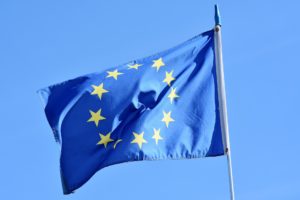Highlights from the Past Week
CW 19 / Monday, 9 to Thursday, 12 May: Committee Meetings Week (Brussels);
PROTECTION OF CHILDREN I – COMMISSION PRESENTS CSAM PROPOSAL: After several deferrals, last week the EU Commission presented the proposal for a regulation to prevent and combat child abuse online. (see press release COM)
The proposal includes search and reporting obligations as well as a very broad scope of application. The regulation is to apply to hosting providers, interpersonal communication services, app stores and Internet access services.
Blocking orders will be requested by the coordinating authorities from the judicial or administrative authorities and must be implemented by the providers within a maximum of 24 hours. Blocking orders on a URL basis apply to Internet service providers. Notifications, removals and blockings will authorise legal action by users and providers. A further focus is on the provision of information to affected users.
In addition, an EU Centre is to be established to assist providers in meeting the new obligations to carry out risk assessments and to detect, report, remove and block child sexual abuse content by providing indicators for the detection of child sexual abuse and receiving reports from providers.
The penalty range of up to 6 per cent of annual turnover goes beyond the GDPR. Penalties for providing incorrect, incomplete or misleading information, failing to reply to or rectify incorrect, incomplete or misleading information, or failing to submit to an on-site inspection shall not exceed 1 per cent of the service provider’s annual income or global turnover of the preceding business year.
The consultation runs until 10 July. In its initial response, eco has delivered a sharp critique of the proposal.
PROTECTION OF CHILDREN II – COMMISSION UPDATES BIK STRATEGY: The Commission also presented the new European strategy for a better Internet for kids (BIK+). This is based on three pillars (see press release COM):
- Safe digital experiences to protect children from harmful and illegal online content, conduct, and risks and to improve their well-being through a safe, age-appropriate digital environment.
- Strengthening of digital literacy so that children acquire the necessary skills and competences to make informed choices and express themselves in the online environment safely and responsibly.
- Active participation, to respect children by giving them a say in the digital environment –
with more child-led activities to foster innovative and creative safe digital experiences.
CYBERSECURITY – TRILOGUE AGREEMENT ON NIS2: EU institutions reached an agreement last week on stricter cybersecurity rules. The new directive obliges companies from “essential sectors” such as energy, transport, banking, financial market infrastructure, and health to observe minimum standards in protecting their IT systems and to inform the competent authorities about any cyber attacks that have occurred.
All medium-sized and large entities from so-called “essential sectors” – such as postal and courier services, waste management, chemicals or food production – will also be covered by the new rules. The obligations also apply in principle to national authorities and may be extended to regional and local governments.
Entities are required by the directive to assess their cybersecurity risk and to take technical and organisational remedial measures. Non-compliance could result in fines of up to 2 per cent of global turnover.
A European Cyber Crises Liaison Organisation Network (EU-CyCLONe) is to facilitate cross-border cooperation in future in the event of large-scale incidents.
The compromise reached in the trilogue still has to be endorsed by the European Parliament and the Council. After the entry into force, the Member States will have 21 months to transpose the directive into national law. (see Table Europe, Council press release)
G7 MEETING ON DIGITAL TOPICS: On 10 and 11 May, G7 ministers responsible for digital affairs met in Dusseldorf to discuss digitalisation and sustainability, the free movement of data, eSafety, competition, standardisation and the digitalisation of trade documents. The Ukrainian Deputy Prime Minister Mykhailo Fedorov participated in the meeting online and provided insights into the country’s cyber defence. The agreements reached included that of better exchanges on the cyber resilience of digital infrastructure.
The upcoming Czech presidency also plans to put a special focus on hybrid threats during its six-month term. (see Euractiv)
EU-US – SECOND TRADE AND TECHNOLOGY COUNCIL: The second EU-US Trade and Technology Council opened in Paris on Sunday in the presence of some top names in US and EU politics. The real business of the day took place on Sunday evening at a dinner at the Château de la Celle near Versailles.
Politico Pro (paywall) published a final version of the joint statement (PDF). The main focus of the discussion was on Russia’s war on Ukraine and how the EU is working with the US to inflict damages on Moscow and to secure global supply chains. A press conference on Monday afternoon will also explain what the TTC’s 10 working groups have achieved since the first summit in Pittsburgh last September.
E-EVIDENCE – BUDAPEST CONVENTION OPENED FOR SIGNATURE: The Council of Europe’s Second Additional Protocol to the Budapest Convention on Cybercrime was opened for signature last week, modernising the original convention.
The text now requires the consent of the European Parliament. However, civil society organisations and some MEPs are calling for an opinion from the European Court of Justice on the protocol’s compatibility with the EU treaties, fearing that it could jeopardise European law, particularly privacy protection. (see Euractiv)
ARTIFICIAL INTELLIGENCE – FURTHER DELAYS: The European Parliament’s draft report was presented last week in a joint meeting of the IMCO and LIBE Committees (video). Meanwhile, the European Parliament’s timetable for the Artificial Intelligence Act has been pushed back again: The deadline for amendments was initially moved from 18 May to 1 June (according to the announcement at the committee meeting). However, as Politico Pro (paywall) reports, it is now to be postponed until 10 June. Luca Bertuzzi (Euractiv) went further to note that the plenary vote on the dossier could even “slip” to 2023.
COMMON CHARGERS – FIRST TRILOGUE: The first political trilogue on the EU legislative proposal on common chargers took place last week. The main divergences between the Council’s and the Parliament’s positions that emerged during the meeting concern in particular the scope of the proposal, the date of its entry into force, decoupling and wireless charging. A further trilogue is to take place before the close of the French Council Presidency at the end of June.
PATH TO THE DIGITAL DECADE – FIRST SHOW OF FORCE: In the Council’s position on the Path to the Digital Decade, adopted by COREPER on Wednesday, the French Presidency managed to add both in the recital and the article a strong reference to the network contribution, namely that “all market actors benefiting from the digital transformation assume their social responsibilties and make a fair and proportionate contribution to the costs of public goods, services and infrastructures”.
Similar language was proposed in the European Parliament by EPP MEPs F.-X. Bellamy and A. Jarubas, which is strongly rejected by the other political groups. According to media reports, the S&D and Renew shadow rapporteurs essentially went against the rest of their groups, which had proposed similar language.
The Industry Committee is set to adopt the Parliament’s position on 17 May, after which the trilogue negotiations might provide a testbed for the power balance on this topic.
EU-US PRIVACY SHIELD – COMMISSION RESPONDS TO EP QUESTION: Following the agreement in principle between the US and the EU, Commissioner Reynders’ response to an EP question shows just how far there is still to go before an agreement can be reached .The response states:
While the agreement in principle marks an important step towards a new arrangement, the details still need to be finalised and translated into legal texts. First, the US commitments will need to be reflected in a new Executive Order to be adopted by the US President and implementing regulations.
On that basis, the Commission will be able to propose a draft adequacy finding and launch the applicable adoption procedure. This involves obtaining an opinion of the European Data Protection Board and a positive vote from Member States in the comitology procedure.
The European Parliament has a right of scrutiny over adequacy decisions. Once this procedure is complete, the Commission will be able to adopt a new adequacy decision.
Meanwhile, the Commission continues to rely on standard contractual clauses as one of several alternatives.
US – FREEDOM OF EXPRESSION RATHER THAN COMBATING HATE SPEECH: In the future, online platforms in the US may find it more difficult to combat hate speech and abuse. On Wednesday, an appellate court lifted a temporary restraining order against a highly controversial Texas law. It prohibits online services with more than 50 million users to take action against any expression of opinions by users. (see )
DIGITAL MARKETS ACT – COREPER GIVES GREEN LIGHT: Last week, the ambassadors of the EU Member States endorsed the result of the negotiations on the DMA. Confirmation at ministerial level is still missing on the Council side.
DIGITAL SERVICES ACT – WRITTEN PROCEDURE (ALMOST) COMPLETED: The DSA shadow rapporteurs were supposed to receive the revised 4-column document last week – in other words, the result of the negotiations between the rapporteur, the Commission and the French Council Presidency. According to media reports, however, this did not happen.
INGE 2.0 – CONTINUATION OF THE SPECIAL COMMITTEE IN THE EUROPEAN PARLIAMENT: The Parliament’s second Special Committee on Foreign Interference in all Democratic Processes in the EU started its work last week and re-elected MEP R. Glucksmann (S&D, FR) as its Chair. The first committee (INGE) concluded its work in March this year with a report that, among other things, called for stricter rules on social media platforms and the funding of political parties. The INGE 2.0 is expected to build on this work and meet as early as this week for its first session, which will focus on Russian disinformation and propaganda. J. Zarzalejos (EPP), M. Løkkegaard (Renew), D. Melbārd (ECR) and W. Cimoszewicz (S&D) were elected as Vice-Chairs. (see EP press release)
Relevant Publications, including from the EP Think Tank:
- Cybersecurity of Open Radio Access Networks (Study)
- High-Level Guidelines on Cybersecurity for SMEs (Study)
- Quarterly Report of the European 5G Observatory (Report)
Outlook for the Current Week
You can find a list of the upcoming dates of the European Parliament here and an overview of the plenary session here. The meeting calendar for 2022 can be found here (PDF).
The DSA and the DMA are on the IMCO agenda for Monday.
An overview of the most important dates of the Council week can be found here, the meeting calendar is accessible here, and the list of the main topics for the coming fortnight is available here.
Included among these dates are:
Summits and Ministerial Meetings:
- Foreign Affairs Council (incl. Data Governance Act), Monday, 16 May and Tuesday, 17 May – Agenda, A items (legislative), A items (non-legislative), Background brief;
- Foreign Affairs Council (Development), Friday, 20 May – Agenda;
Preparatory Bodies:
- Working Party on Competitiveness and Growth (Industry), Monday, 16 May;
- Working Party on Competitiveness and Growth (Better Regulation), Monday, 16 May;
- Working Party on Intellectual Property, Monday, 16 May;
- Working Party on Telecommunications and Information Society (incl. AI, eIDAS), Tuesday, 17 May;
- Horizontal Working Party on Cyber Issues, Tuesday, 17 May;
- Working Party on Consumer Protection and Information, Tuesday, 17 May and Thursday, 19 May;
- Working Party on Cooperation in Criminal Matters (COPEN), Wednesday, 18 May;
- Audiovisual Working Party, Wednesday, 18 May;
- Working Party on Competitiveness and Growth (Industry), Thursday, 19 May;
- Working Party on Competition, Thursday, 19 May;
- Working Party on Competitiveness and Growth (Internal Market), Friday, 20 May;
- COREPER I Wednesday, 18 May and Friday, 20 May;
- COREPER II (incl. minimal tax) Wednesday, 18 May and Friday, 20 May;
Information on the weekly Commission Meeting can be found in the preview (PDF) or (at short notice) in the current agenda. A topic of particular relevance is that of the Media Freedom Act (29 June).
The following topics are on the agenda for the coming week:
- RePowerEU plan
- Relief and reconstruction of Ukraine
- Analysis of the defence investment gaps
- International partnerships and energy package
- New strategy on international energy engagement
- Joint Communication on a partnership with the Gulf
- European Semester Spring Package
You can find the judicial calendar of the ECJ here.
European Parliament Committees
CW 20 / Monday, 16 to Thursday, 19 May: Mini Plenary Sessions Week (Brussels);
LIBE Committee (EP)
Current Meetings
- None
Further Meetings (Calendar)
- Monday, 30 May 2022, 16.45-18.45 (Brussels)
JURI Committee (EP)
Current Meetings
- Tuesday, 17 May 2022 (Brussels), 13.45-14.45 and 16.50-18.45 (Brussels)
Excerpt from the Draft Agenda
…
17 May 2022, 16.45 – 17.45
…
- Exchange of views with Věra Jourová, Vice-President of the European Commission for Values and Transparency
* * *
17 May 2022, 17.45 – 18.45
- Hearing on Legal tech and e-Justice
…
Further Meetings (Calendar)
- Monday, 2 June 2022 (Brussels)
Dossiers Timetable (11 April 2022)
ITRE Committee (EP)
Current Meetings
- Monday, 16 May2022, 13.45-15.45 and 16.45-17.45 (Brussels)
- Tuesday, 17 May2022, 9.00-12.00 and 13.45-15.45 and45-18.45 (Brussels)
Excerpt from the Draft Agenda
16 May 2022, 13.45 – 15.45
…
- Measures for a high common level of cybersecurity across the Union, repealing Directive (EU) 2016/1148
ITRE/9/04961
| Rapporteur: | ||
| Bart Groothuis (Renew) | ||
- Reporting back to committee on the negotiations (Rule 74(3))
…
- Establishing the 2030 Policy Programme “Path to the Digital Decade”
ITRE/9/07309
***I 2021/0293(COD) COM(2021)0574 – C9-0359/2021
| Rapporteur: | |||
| Martina Dlabajová (Renew) | PR – PE719.734v01-00 AM – PE730.058v01-00 |
||
| Responsible: | |||
| ITRE | |||
| Opinions: | |||
| ECON | Decision: no opinion | ||
| EMPL | Dragoş Pîslaru (Renew) | AD – PE704.900v02-00 AM – PE729.960v01-00 AM – PE719.926v01-00 |
|
| IMCO | Ivars Ijabs (Renew) | AD – PE704.564v02-00 AM – PE719.618v01-00 |
|
| CULT | Sabine Verheyen (PPE) | AD – PE703.286v02-00 AM – PE719.621v01-00 |
|
- Adoption of draft report
- Deadline for tabling amendments:24 March 2022, 12.00
…
Further Meetings (Calendar)
- Monday, 2 June 2022, 9.00-12.00 (Brussels)
Dossiers Timetable (5 May 2022)
IMCO Committee (EP)
Current Meetings
- Monday, 16May 2022, 13.45-15.45 and 16.45-18.45 (Brussels)
- Tuesday, 17 May 2022, 9.30-12.00, 13.45-15.45 and 16.45-18.45 (Brussels)
Excerpt from the Draft Agenda
16 May 2022, 13.45 – 15.45
…
- Contestable and fair markets in the digital sector (Digital Markets Act)
IMCO/9/04998
***I 2020/0374(COD) COM(2020)0842 – C9-0419/2020
| Rapporteur: | |||
| Andreas Schwab (PPE) | |||
| Responsible: | |||
| IMCO* | |||
- Vote on the provisional agreement resulting from interinstitutional negotiations (to be confirmed)
Report on ongoing interinstitutional negotiations
- Single Market For Digital Services (Digital Services Act) and amending Directive 2000/31/EC
IMCO/9/04992
***I 2020/0361(COD) COM(2020)0825 – C9-0418/2020
| Rapporteur: | |||
| Christel Schaldemose (S&D) | |||
| Responsible: | |||
| IMCO* | |||
- Reporting back to committee on the negotiations (Rule 74(3))
- Amending Directive 2014/53/EU on the harmonisation of the laws of the Member States relating to the making available on the market of radio equipment
IMCO/9/07216
***I 2021/0291(COD) COM(2021)0547 – C9-0366/2021
| Rapporteur: | |||
| Alex Agius Saliba (S&D) | |||
| Responsible: | |||
| IMCO | |||
- Reporting back to committee on the negotiations (Rule 74(3)) (to be confirmed)
- Resilience of critical entities
IMCO/9/04990
| Rapporteur for the opinion: | ||
| Alex Agius Saliba (S&D) | ||
* Reporting back to committee on the negotiations
…
17 May 2022, 16.45 – 18.45
With the Commission
- Single Market Emergency Instrument (SMEI): Feedback from the public consultation on potential responses concerning crisis-related disruptions of the Single Market* Exchange of views
- Crisis response, contingency planning and risk management mechanisms in the context of the Digital Single Market* Exchange of views
…
Further Meetings (Calendar)
- Open
Dossiers Timetable (May 2022)
CULT Committee (EP)
Current Meetings
- Tuesday, 17 May 2022, 9.00-12.00 and 13.45-15.45 (Brussels)
Excerpt from the Draft Agenda
The current agenda does not contain any topics with overt relevance for the Internet industry.
Further Meetings (Calendar)
- Wednesday, 15 / Thursday, 16 June 2022 (Brussels)
Further Scheduled Parliamentary Calendar Dates
- CW 21 / Monday, 23 to Friday, 27 May: Green Week (no meetings);
- CW 22 / Monday, 30 May to Thursday, 2 June: Political Group and Committee Meetings Week (Brussels);
- CW 23 / Monday, 6 to Thursday, 9 June: Plenary Sessions Week (Strasbourg);




